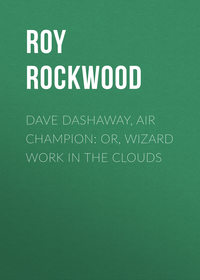
Dave Dashaway Around the World: or, A Young Yankee Aviator Among Many Nations
“No, I believe his motives lead in an entirely different direction this time,” replied Dave, but he would say no more on the topic just then. He resumed: “Of course, we must find the Comet by this time to-morrow, or start in the race with another machine.”
“Oh, then we’ll go anyway?” asked Hiram, brightening up. “Say, that’s great!” and he uttered an immense sigh of relief.
“Mr. Brackett has telegraphed for the Zephyr, which is at Baltimore,” explained Dave. “It will be on the grounds before night.”
“Have you any clue as to what has become of the Comet?” asked Hiram.
“I have a very strong theory,” replied the young aviator. “Whoever made away with the Comet did not venture to fly north – too many machines were on their way to the meet, and they would be seen. The manager wired in every direction. An unknown airship was sighted twice, early this morning, both times about fifty miles from Washington, going southwest and making for the mountain districts.”
“What do you guess from that, Dave?” inquired Hiram, eagerly.
“I think they are trying to hide or lose the Comet until it is too late to start in the race. Of course, hopeless as it may seem, we must try and recover the machine.”
“Yes, the Zephyr cannot begin to compare with our special machine,” said Hiram.
“Besides that,” added Dave, “I hope to find out who ran away with the biplane. If Vernon is indeed back of it, that discovery would throw a good deal of light on a certain subject in which I am greatly interested at the present time.”
Hiram was prudently silent. He wondered to himself, however, if the subject at which his companion hinted had anything to do with the young lady in the automobile and Dave’s visit to the Hampton Flats.
It was about eleven o’clock when the young airman stopped at a town named Wayne. He made a second stop at a little settlement ten miles beyond. The automobile had now gotten well in among the hills, and the scenery had grown wilder and wilder.
“Some airship passed over here just before daylight this morning,” Dave finally reported to Hiram.
“Do you know the direction it went in?” asked the latter.
“Yes. We will keep on and make Tarryford. If we get no information there, I guess we will have to give up the hunt.”
It was shortly after noon when they passed an old farmhouse. As they whizzed by, Hiram remarked some sheds in ruins, and smoking yet as if recently consumed by fire. He called the attention of his comrade to the fact. They sped on. Less than half a mile accomplished, they saw ahead a steep, high hill. By the side of the road, seated on a level rock, was a man holding a rifle between his knees.
Something about the grim, watchful manner of the farmer attracted the curious attention of both of the boys. Dave brought the machine to a halt at the side of the road.
“Say, my man,” he called out, pleasantly, “have you seen or heard of an airship anywhere around here this morning?”
It was quite startling the way the farmer came to his feet. His eyes flashed and he handled his weapon in a menacing way.
“Have I?” he cried, fiercely. “I reckon so, and I’m ready to riddle the troublesome old contraption the minute she shows herself again!”
CHAPTER VII
FOUND
“We’re going to find out something sure,” declared Hiram. “Say, Dave, that man knows something about our machine.”
The young airman leaped from the auto and approached the farmer. The latter stood viewing the newcomers in a surly, suspicious way.
“You say you have seen an airship,” observed Dave. “Where? when?”
The farmer eyed our hero and his companion shrewdly.
“What do you want to know for?” he questioned.
“Well,” answered Dave, bluntly, “someone stole a biplane from the aero field, near Washington, last night, and we are looking for it.”
“Oh, you are?” muttered the man. “Belongs to you, maybe?”
“To a company which we represent.”
“Responsible for damages?” insinuated the farmer, with a shrewd glint in his calculating eyes.
“Is there some damage to account for?” inquired Dave.
“I reckon,” pronounced the man seriously. “Did you happen to notice the last farm down the road?”
“We saw it, mister,” nodded Hiram, impatient to hurry up the man with his disclosures.
“I suppose you saw them smoking ruins. Them was a shed, a pigsty and a stack of hay. I don’t reckon fifty dollars would replace them.”
“What has an airship to do with them?” inquired Hiram.
“Everything. See here, just at daylight this morning I came to the back door. I heard a whir and a ping overhead, and I saw an airship going licketty-switch. Just as it passed over the house, some one in it must have thrown a lighted cigar overboard. I didn’t see it fall, but after I had gone into the house and finished dressing and came out again, I saw the airship dropping into the basin on top of Pike Hill up yonder. Then I smelled smoke. I ran around towards the sheds. The stack was blazing. I know it was a cigar that started it, for I found one on the ground where the fire started, and we smoke nothing but corncob pipes around these diggings.”
“And you say the airship landed on top of Pike Hill, as you call it?” inquired Dave. “How do you know that?”
“Say, get up on this rock with me. That’s it. Now then, take a squint past the spur of rock way up near the crest of the hill. See it?”
“Hello!” instantly exclaimed Hiram, in a state of great excitement.
“Why, sure as you live it’s the end of a wing,” declared Dave. “Have you seen anything of the persons running it, mister?”
“No, I haven’t. The way I figure it out is that they ran out of steam. Mebbe they thought no one saw them when they flew over the farm. Mebbe they’re hiding. Mebbe, when they saw me start on guard down here with my rifle, after we’d tried to put the fire out, they were afraid to budge.”
“It is very likely they alighted on account of the lack of gasoline,” Dave said to Hiram. “We didn’t leave much in the tanks last night.”
“That’s so,” assented Hiram. “What are you going to do?”
The young aviator reflected for a moment. Then he turned to the man again.
“See here, mister,” he said, “I must find out the condition of that biplane up there. It may not be ours. If it is, I promise you one thing.”
“And what’s that?” demanded the farmer.
“Your bill will be paid, and as much more on top of it for directing us to the machine. Is the ascent of the hill hard?”
“A stranger might find it so,” replied the man. “Very few ever go there, and there’s no regular path to the top. If you’ll wait till some neighbors I’ve sent for to help rout out those fellows up there come, we’ll make an attack on them.”
“I don’t think you will find anybody up there,” said Dave. “No, I don’t,” he reiterated, as Hiram regarded him inquiringly. “I reason it out just as I said at the first, that whoever stole the Comet planned to hide it where we couldn’t find it. That is a capital place up there to fit into their scheme. I’ll tell you, mister, you stay down here if you want to, and we will go up and see what we can find out.”
“I don’t know about that,” demurred the farmer, suspiciously.
“Why not?” inquired Dave.
“How do I know but what you belong to the crowd and have been telling me a fool story all along? Easiest thing in the world for you to start up in the airship and leave me to whistle for my damages.”
“What, with the automobile here for security?” asked Dave, with a laugh.
“That’s so,” remarked the farmer, thoughtfully. “All right, go ahead. You’ll find it no easy job, though. I can tell you another thing – if I see that airship rising, I’ll plug it.”
“We will report to you before we go away,” promised the young aviator. “Come on, Hiram.”
The farmer had not misstated the ascent of Pike Hill. Country bred as he was, Hiram grumbled heartily at the brambles, and Dave got tangled several times in a network of hampering vines.
“Whew! the last climb,” announced Hiram, finally, as they gained a topmost ridge of rocks.
“No one here,” cried the young airman. “See, Hiram, they have let the Comet sink down into this natural basin here, thinking it was a safe hiding place.”
“It would have been a famous one if that old farmer hadn’t caught sight of the machine,” said Hiram. “No one would ever think of looking for an airship in this out of the way place.”
The Comet lay slightly tipped to one side, unharmed. Dave examined the machine casually.
“Everything is all right,” he reported to his companion. “I was correct about the gasoline. There isn’t enough juice left to run the machine a mile.”
“But where are the people who stole it?” asked Hiram.
“Went down the other side of the hill, I suppose. They had accomplished what they were hired to do. Now then, Hiram, this is a great piece of good luck.”
“I should say so,” enthused Hiram.
“You go back down the hill – it will be easier than climbing up.”
“I should hope so,” grimaced Hiram, rubbing his bruised knees.
“Tell the man down there about the situation, and that I am going to fly the machine over onto his farm and fix things up with him.”
Dave waited till his handy assistant had reached the bottom of the hill. In a few moments, on the watch for some signal from below, he noticed Hiram conversing with the farmer. There were apparent explanations and discussions. Then Hiram waved his hand as had been agreed on with the young aviator, and Dave knew that the coast was clear for a run with the biplane.
CHAPTER VIII
SOMETHING OF A MYSTERY
Our hero found the gasoline tanks pretty well emptied of oil. He realized that the “juice” on hand would not admit of a long flight. Satisfied, however, that there was sufficient fuel to fly the Comet out of its resting place and down to level ground, Dave got to the pilot post and operated the self-starter.
The biplane arose promptly to the occasion. A little deft guiding cleared the hill. The machine and its occupant came safely and gently to a new landing place in a field nearby. Hiram and the farmer hastened to the spot as Dave alighted.
“I call that purty cute,” announced the farmer, a good deal interested. “Now then, stranger, what about them damages?”
“Just what I said,” replied Dave. “You have done us a great service and we appreciate it. There is your money.”
“Say, you’re square and white,” declared the farmer, overjoyed at the possession of so much cash.
“We try to be,” answered Dave, pleasantly. “Just sign that receipt, will you? The aeroplane company will pay for this, and I want my voucher all straight and regular.”
Dave wrote out a receipt on the back of a card and the man signed it. Then the young aviator proceeded to the automobile.
“Can’t I help you some?” inquired the farmer, accommodatingly.
“If you will loan us a tin pail for a bit it will be of service to us,” replied Dave. “There is plenty of spare gasoline in the auto tank, Hiram,” he explained.
It did not take the boys long to transfer enough of the gasoline to last the Comet for a home flight. Dave arranged to fly the machine and directed Hiram to take charge of the automobile.
It was about two o’clock in the afternoon when the adventurers reported on the aero grounds. Mr. Brackett was delighted at their success and Elmer was fairly overjoyed. No damage whatever had been done to the biplane, it was found, after a careful inspection of the machine.
“I say, Dave,” spoke Hiram, as he and his chief sat eating a fine dinner sent by Mr. Brackett from the restaurant; “there’s a good deal about this business that puzzles me.”
“I suppose that is true,” responded the young aviator, with a slight smile. “What principally is troubling you, Hiram?”
“Why, the whole proceeding. If somebody wanted to put us out of business, why didn’t they sink the airship somewhere or burn it up?”
“I think they counted on the Comet remaining undiscovered until long after the other entries had started,” said Dave.
“Spite, then?” suggested Hiram.
“No, I don’t think that.”
“Then if that Vernon had anything to do with it – ”
“I am satisfied that he did,” declared Dave. “His object was not to keep Elmer from getting out of the country, though.”
“Why, what else could it be?” questioned Hiram in wonderment.
“I shall tell you later, Hiram,” replied Dave in quite a serious way. “The fact is, there are some things about stealing the airship that I do not entirely understand myself. When I have posted myself on those details, I fancy I shall have a decidedly interesting story to tell you and Elmer.”
“Say, can I ask you one question?” propounded Hiram, and then, as Dave nodded in assent, he added: “Has that girl, and your visit to the city and the appearance of Vernon at the Hampton Flats got anything to do with it?”
“Everything, in my opinion,” answered the young airman, gravely.
“Humph!” commented Hiram. “A romance and a mystery, eh?”
“Hardly, Hiram,” responded Dave gravely. “It is business, pure and simple. I will say this much to you at the present time: whatever dealings I am having with Mr. Deane, the father of the girl you saw, may involve all the skill and nerve the crew of the Comet have at their command.”
The young airman had given his interested assistant a good deal to think over. Hiram, however, and in fact everybody about the place, were soon immersed in things strictly professional. At noon the following day the race around the world was to start. There were not a large number of entries, but every individual contestant had his own pet machine and his coterie of friends and admirers.
The field was a lively scene all day. The various machines made trial flights. Then there was the packing of supplies, which necessarily had to be of limited volume. All of the contestants in turn visited the office of the Aero Association to receive definite route instructions. There was a good deal of red tape to go through, credentials to secure, and arrangements made for reporting progress to headquarters from set points along the route.
The young aviator and his assistants spent nearly an hour over a blue print map which had been furnished each of the contestants by the management of the event. Hiram got out a geography and studied out the situation in a more detailed way. Elmer, at the suggestions of Dave, made two copies of the list of points from which the Comet was to report progress.
The boys were interrupted in this congenial work by the appearance of one of the hangar men at the door of the living tent. He beckoned to Dave, who at once went outside, received some message, and called back to his friends:
“I’ve got to go to the city, fellows. Won’t be over two hours. Keep a close watch on everything until I get back.”
“Wonder what’s up now?” remarked Hiram, speculatively. Then he went to the door and looked out. “H’m,” he observed, “Dave has a good deal of mysterious business on hand, it seems to me.”
“Where has he gone?” asked Elmer only casually, for he was deeply absorbed in his work.
“To the city he said, and say, in that same automobile that brought the young lady here day before yesterday.”
“Well, it must be something important to take Dave away from here at just this time,” commented Elmer.
The young aviator reappeared about two hours later. The chauffeur who had come for him brought him back. Dave came into the living tent all briskness and cheery as usual. The watchful Hiram, however, whispered cautiously to Elmer that “he acted as if he had something heavy on his mind.”
The boys made frequent visits to the Comet during the evening. Hiram noticed that Dave seemed very solicitous that a double watch should be kept over the machine during the night. He hired two extra men to spell the regular watchmen, and gave them close directions as to their care of the biplane.
A band of music woke up the three young airmen early in the morning. It announced a reception to some French experts who had arrived to take part in the international flights. Dave was out of bed first, as usual, and bolted out of the place, anxious to see if all was well with the Comet.
Hiram and Elmer began to dress. They felt buoyant and eager for the work of the day. In sport, as Elmer finished dressing first, he made a grab for the pillow on the cot Dave had occupied and sent it hurtling at the head of his companion.
“That’s the last pillow you’ll see for a long time to come,” he announced. “Hello! Why, Hiram, look here!”
The speaker stood stock still, gazing spellbound at the head of the cot whence he had taken the pillow. Hiram, joining him, looked down like himself in sheer, startled wonder.
CHAPTER IX
THE PATH OF THE EAGLE
“Well, I declare!” almost shouted Hiram Dobbs.
“I should say so,” vociferated Elmer. “You see, Dave in his hurry forgot that package under his pillow. There’s a photograph – ”
“Of the girl who came in the automobile! What is it Dave calls her? Oh, yes – Edna Deane.”
“And that pile of bank bills, Hiram!” cried the astounded Elmer, as he gingerly flicked over the edge of a heap of bills surrounded by an elastic band. “Big bills! See, look! Why, there must be hundreds there!”
“Hundreds?” repeated Hiram, equally dumbfounded, like his comrade. “See the printed figures on that paper band – ‘$5,000.’ Don’t touch them, cover them up. It’s Dave’s business, and we have no right to spy into his affairs. All the same – thunder!”
Elmer replaced the pillow. Then both boys sat down on stools and stared at the cot and then at each other.
“It’s a mystery,” broke out Elmer, after a tantalizing spell of silence. “What’s Dave doing with all that money? It puzzles me.”
“No, it’s what is he going to do with it,” corrected Hiram. “You can make up your mind, it’s business. The girl’s picture I can’t exactly figure out. Dave will explain it all when the right minute comes. Here he is now.”
Somewhat flushed, the young aviator came hurrying into the tent. Hiram pretended to be arranging his necktie and Elmer was lacing a shoe. Dave proceeded to the bed and threw aside the pillow. He stored the package he found there in an inside pocket.
“You want to hurry, fellows,” he said. “There’s a lot to do this morning, you know.”
There was so much to do, that after a hurried breakfast the crew of the Comet found every minute occupied for the ensuing two hours. The Comet was in perfect trim for the start. There were a hundred little things to think of in the way of supplies and duplicate parts of machinery. Mr. Brackett appeared on the scene early, and went over the biplane he understood so well with the care and anxiety of an automobile owner entering his pet car for a race.
All the time bands were playing, banners flying, and a vast concourse of people had gathered. There was a speech from the president of the National Aero Association, with the contestants to the fore. The young airman and his friends went down the line, looking over the various machines that were to take part in the event. Each one bore a numeral, and had some distinctive mark that gave it a clear identity.
“We are number three,” said Hiram. “That was always my lucky number. I went to school three years, got licked three times before I left and worked three years on the farm. This is the third big event I’ve had anything to do with, there are three of us – ”
“Three cheers for number three!” cried Elmer. “There’s father beckoning to me. No, he wants us all, fellows.”
Our hero and the aero manufacturer had talked over all business details earlier in the morning. The kind-hearted Mr. Brackett, however, could not see his proteges start out on a long and perilous flight without a few words of fatherly counsel. He gave them some sensible advice, and Dave fancied he looked with considerable pride at Elmer. It was with satisfaction that the indulgent father compared the present courageous ambitions of his son with the useless life the prodigal had once led.
A bell was rung at the grandstand. This was the half-hour preparation signal. The airmen now proceeded to their machines. The scene became one of lively activity and gay colors. The Comet, neat, compact and perfect, showed up for the beautiful piece of mechanism it was in the clear, dazzling sunlight. Its crew, nattily attired, seemed to fit into a pleasing natural picture.
There was no expectation of a general uniform start when the second bell rang. With the long perilous journey before them, it was a matter of small consequence starting on the moment. Some of the aeroplanes, in fact, would not be in line for some hours to come. Ever ready at the business call, however; always on time as a matter of principle, the young pilot of the Comet wasted no time. Number three was the first to leave the field, and got all the first overflow of cheers and enthusiasm. Until a course due northwest was attained, Elmer and Hiram sat waving to the little group outside of their abandoned hangar. Mr. Brackett kept them in sight until the Comet was a fading blur, a mere speck in the far distance. The splendid machine struck its best gait staunchly, steadily, leaving a gasoline trail behind.
The boys had talked so much over the trip – they understood the Comet so well, that everything went like clockwork. Elmer had charge of the maps and charts. Hiram insisted on being purser extraordinary. All hands were prepared for any emergency that might arise.
The Aero Association had mapped out the general route the contestants were to pursue. None was tied to rigid rules, however, outside of reporting at certain stations. All this had been arranged by letter and cable. The first reporting stop was to be made at Chicago, the next at Winnipeg. Between all reporting points, the contestants could follow their own route. They could land when they chose. Each one, however, must report at the stations designated and secure the credentials necessary to prove that he was still in the race.
The route chart showed towns and cities where an aero club or interested airman could be located. These would also answer as repair and supply stations. Even in foreign countries, so far as could be arranged, the contestants would be able to locate friends and receive succor or assistance as needed.
“We are going to blaze a great international trail,” observed Hiram, proudly.
“That is, if we get through all right,” remarked Elmer.
“Oh, we’ve got to do that,” proclaimed his light and airy comrade. “The Comet was made to do it. I wonder how many of the others will even reach Canada?”
“There were twelve entries,” spoke their pilot. “I will say, a finer lot of machines never started a flight. Of course they won’t all get through.”
“It will be kind of lonesome when we get pretty well scattered, and trailing over some desert or water waste, way out of range of civilization; eh, fellows?” suggested Elmer.
The Comet made a non-stop run of nearly two hundred miles. It was mid-afternoon when they descended half-way across a high mountain range. Dave went all over the machine and Elmer oiled and cleaned up the bearings. Hiram gathered some scraps for a little fire, and they had hot coffee, as well as ham broiled on long forks, and the rest of a really good meal.
Then there was a pleasant chat, some exercise, and they were all aboard again and driving through a brief mountain rainstorm, coming into clear weather beyond.
Before dusk Hiram reported four competitors visible through his field glass. Two of them came pretty near to the Comet, and one signalled them. Then their routes deviated, and after a second landing the boys got ready for a six-hour steady night run.
About two o’clock in the morning they landed in a convenient field. The register showed four hundred and ninety-two miles accomplished in a little less than fourteen hours, almost straight flying.
It was late in the afternoon of the day following that the Comet came to a stop on the aero grounds just outside of Chicago. From having been there before and from their description chart, Dave was able to locate the place readily.
No meet was on at the time, but enthusiastic brother airmen were on hand expecting an arrival. Amid cheers and warm hand clasps, the tired crew of the Comet were greeted royally.







